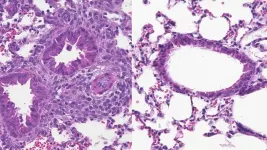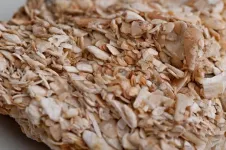(Press-News.org) May 8, 2024—(BRONX, NY)—Researchers at the National Cancer Institute-designated Montefiore Einstein Comprehensive Cancer Center (MECCC) have shown that a breakthrough therapy for treating blood cancers can be adapted to treat solid tumors—an advance that could transform cancer treatment. The promising findings, reported today in Science Advances, involve CAR-T cell therapy, which supercharges the immune system to identify and attack cancer cells.
“CAR-T cell therapy has revolutionized the treatment of blood cancers such as leukemia and lymphoma but hasn’t worked well against solid tumors,” said Xingxing Zang, Ph.D., the paper’s senior author. “We found that our changes to standard CAR-T cell therapy can significantly boost its effectiveness against solid tumors, including often-fatal pancreatic cancer and glioblastomas.” Dr. Zang is a member of MECCC Cancer Therapeutics Research Program and professor of microbiology & immunology, of oncology, of medicine, and of urology, the Louis Goldstein Swan Chair in Cancer Research and the founding director of MECCC’s Institute for Immunotherapy of Cancer at Albert Einstein College of Medicine. The first author of the paper is Christopher Nishimura, an M.D./Ph.D. student in Dr. Zang’s lab.
Developing Personalized Cancer Killers
Dr. Zang and his colleagues created five CAR-T therapies that they tested on mice implanted with several types of solid human tumors. One of the therapies—which used two novel components—proved superior in safely and effectively shrinking not only glioblastoma and pancreatic tumors but lung cancer tumors as well.
CAR-T cell therapy, short for chimeric antigen receptor (CAR)-T cell therapy, is a marvel of genetic engineering that transforms T cells (a type of immune cell) into cancer-seeking missiles programmed to attack on contact. The therapy involves extracting the patient’s own T cells and equipping them with a single gene that codes for several different proteins. (“Chimeric” comes from the Chimera of Greek mythology with its lion’s head, goat’s body, and serpent’s tail.) The genetically modified T cells are allowed to multiply and are then infused back into the patient.
Their specially designed gene enables the infused T cells to express synthetic CAR receptors on their surface. The CARs can recognize specific proteins, known as antigens, that protrude from cancer cells. Thanks to their new CARs, the T cells are able to home in on cancer cells and then switch to attack mode.
CARs contain four key proteins, and Dr. Zang and his colleagues achieved success against solid tumors by altering two of them. (See illustration of CAR-T cell receptor below.)
Five CAR-Ts Confront Three Types of Cancer
All five CAR-T therapies developed by the Zang team used the same novel targeting protein: a monoclonal antibody that binds to B7-H3, a cancer-cell antigen widely expressed on most solid tumors and their blood vessels. Dr. Zang had previously helped to discover that B7-H3 allows tumors to evade immune attack by interfering with T cells.
“We wanted our CARs to not only attach T cells to solid tumors but also—by binding specifically to B7-H3—to prevent B7-H3 from interfering with the T cells’ ability to attack and destroy cancer cells and their blood vessels,” said Dr. Zang.
Simply attaching CAR-T cells to tumor cells isn’t enough to kill them. CARs must also include a costimulatory protein to help activate T cells once they’ve made contact with cancer cells. Four of the five CAR-T cell therapies developed by Dr. Zang’s lab used previously deployed costimulatory proteins. But their fifth therapy used a protein never before tried in CAR-T cell therapy. In 2015, Dr. Zang discovered that T cells possess a receptor he called TMIGD2 that activates T cells when stimulated. He later realized that incorporating TMIGD2 into CAR-T cells might enable them to overcome the challenges posed by solid tumors.
“Factors such as low-oxygen levels and immune checkpoints inside solid tumors make for a hostile microenvironment that can strongly suppress immune attack by T cells—which also have trouble penetrating solid tumors’ dense connective tissue network,” Dr. Zang said. “It seemed possible that using TMIGD2 as a costimulatory protein could give CAR-T cells the activation boost they need to reach cancer cells and persist within solid tumors.”
These novel CAR-T therapies were tested on mice bearing three solid human tumors: pancreatic, lung, and glioblastoma. All were equally likely to bind their T cells to cancer cells, since their CARs all possessed the same novel antibody aimed at the B7-H3 antigen. The most effective one possessed both the novel antibody and the TMIGD2 protein—a CAR that Dr. Zang calls a TMIGD2 Optimized Potent/Persistent (TOP) CAR.
The TOP Choice
The CAR-T therapy with TOP CAR proved best at keeping mice with pancreatic, lung, and glioblastoma tumors alive. For example, TOP CAR treatment enabled 7 out of 9 mice with glioblastoma tumors to survive, compared with a maximum survival of 3 out of 9 mice achieved by any of the other CAR-T therapies. It was also superior with respect to key effectiveness and safety parameters.
Dr. Zang plans to further develop TOP CAR into an “off-the shelf” platform that can simultaneously target B7-H3 as well as other tumor antigens and can readily be tailored for treating many different types of solid tumors. Einstein has intellectual property protection for a portfolio of Dr. Zang’s research and is interested in securing commercial partners to help to move his novel TOP CAR therapy into clinical trials in the near future, including for cancer of the brain, liver, pancreas, ovary, prostate, lung, bladder, colon, and others. Over the past several years, Dr. Zang has developed two other anti-cancer drugs that are being evaluated in phase 1 and phase 2 clinical trials in the United States and other countries.
The paper is titled “TOP CAR with TMIGD2 as a safe and effective costimulatory domain in CAR cells treating human solid tumors.” Other Einstein authors are Devin Corrigan, M.S., Xiang Yu Zheng, B.S., Phillip M. Galbo Jr., Ph.D., Shan Wang, M.D., Yao Liu, Ph.D., Yau Wei, M.D., Linna Suo, M.D.,Wei Cui, Ph.D. and Deyou Zheng, Ph.D. Other authors are Nadia Mercado, Sc.M., of Brown University School of Public Health and Cheng Cheng Zhang, Ph.D., of the University of Texas Southwestern Medical Center.
Dr. Zang and Mr. Nishimura are inventors of two pending patents: Chimeric antigen receptors comprising a TMIGD2 costimulatory domain and associated methods of using the same; and Chimeric antigen receptors targeting B7-H3 (CD276) and associated methods. Dr. Zang is an inventor of a pending patent: Monoclonal antibodies against IgV domain of B7-H3 and uses thereof. Other authors declare no conflicts of interest.
About Montefiore Einstein Cancer Center
Montefiore Einstein Cancer Center (MECC) is a national leader in cancer research and care located in the ethnically diverse and economically disadvantaged borough of the Bronx, N.Y. MECC combines the exceptional science of Albert Einstein College of Medicine with the multidisciplinary and team-based approach to cancer care of Montefiore Health System. Founded in 1971 and a National Cancer Institute (NCI)-designated Cancer Center since 1972, MECC is redefining excellence in cancer research, clinical care, education and training, and community outreach and engagement. Its mission is to reduce the burden of cancer for all, especially people from historically marginalized communities.
END
Strengthening CAR-T therapy to work against solid tumors
2024-05-08
ELSE PRESS RELEASES FROM THIS DATE:
Exercise, new drug class recommended for management of hypertrophic cardiomyopathy
2024-05-08
The American College of Cardiology (ACC) and the American Heart Association (AHA) today released a new clinical guideline for effectively managing individuals diagnosed with hypertrophic cardiomyopathy (HCM). The guideline reiterates the importance of collaborative decision-making with patients who have HCM and provides updated recommendations for the most effective treatment pathways for adult and pediatric patients.
HCM is an inherited cardiac condition most often caused by a gene mutation that makes the heart muscle too thick (hypertrophy), which impairs its ability to adequately pump blood throughout ...
Study: Heavy snowfall and rain may contribute to some earthquakes
2024-05-08
When scientists look for an earthquake’s cause, their search often starts underground. As centuries of seismic studies have made clear, it’s the collision of tectonic plates and the movement of subsurface faults and fissures that primarily trigger a temblor.
But MIT scientists have now found that certain weather events may also play a role in setting off some quakes.
In a study appearing today in Science Advances, the researchers report that episodes of heavy snowfall and rain likely contributed to ...
USC study reveals role of iron in allergic asthma and points to potential new therapies
2024-05-08
New USC research shows that iron serves as a gas pedal driving certain immune cells that cause inflammation in the lungs during an allergic asthma attack – and blocking or limiting iron may reduce the severity of symptoms.
During an attack, immune cells known as group 2 innate lymphoid cells (ILC2s) can become overactive, causing excessive inflammation and a tightening of the airways, making it difficult to breath. However, the underlying biology is poorly understood.
Now, researchers from the Keck School ...
SARS-CoV-2 and type 1 diabetes in children: new study aims to explore the relationship
2024-05-08
Type 1 diabetes is an autoimmune disease that leads to disrupted glucose metabolism. It requires lifelong insulin therapy. The Global Platform for the Prevention of Autoimmune Diabetes (GPPAD) collaborates within a European network to develop new methods to prevent this condition which is, to date incurable. AVAnT1A is GPPAD's third intervention study. It will investigate whether vaccination against SARS-CoV-2 in the first year of life can protect children who have an increased genetic risk for type 1 diabetes from developing the condition. The study is supported by funding from The Leona M. and Harry B. Helmsley ...
ECOG-ACRIN adds another trial to the ComboMATCH precision oncology study platform
2024-05-08
Another ECOG-ACRIN Cancer Research Group (ECOG-ACRIN) treatment trial is open as part of the ComboMATCH precision medicine study platform. ComboMATCH-E5 is evaluating treatment for patients with KRAS G12C-mutated advanced solid tumors with two different targeted drugs given together. The two drugs include the KRAS G12C inhibitor sotorasib and panitumumab, a human monoclonal antibody antagonist specific to the epidermal growth factor receptor (EGFR). Each drug is approved by the US Food and Drug Administration (FDA) as single-agent therapy for particular cancer types.
"Given the preclinical data demonstrating EGFR over-dependency ...
UT Institute of Agriculture invests in premier poultry research facility
2024-05-08
Poultry production and processing is a $10 billion industry in Tennessee, with more investment expected. To support the future of the industry, the University of Tennessee Institute of Agriculture is investing in the construction of a state-of-the-art, next generation poultry research and education facility at its Middle Tennessee AgResearch and Education Center in Spring Hill.
On Thursday, May 2, nearly 100 state and local officials and members of the poultry production and processing industry joined university officials to celebrate the official groundbreaking for the new project. Four commercial-size (54’ ...
ESMO Breast Cancer 2024: Event announcement
2024-05-08
Lugano, Switzerland, 8 May 2024 – ESMO Breast Cancer 2024 will be held in Berlin, Germany, between 15-17 May where the latest research in breast cancer will be presented. Participants from all over the world are expected to come to Berlin to listen to renowned experts presenting key innovative areas – including new agents, molecular and functional diagnostics, biomarkers and cutting-edge research applications – and providing perspectives on how transformative new data can find a clear path to the clinic.
The congress can be attended in person and online.
The scientific programme is ...
Seven faculty members elected AAAS Fellows
2024-05-08
Each year, the American Association for the Advancement of Science elects distinguished scientists, engineers and innovators to become AAAS Fellows. Seven faculty members from the University of Tennessee, Knoxville, were awarded this lifetime honor as members of the recently announced 2023 class of AAAS Fellows.
Elected faculty are Rigoberto Advincula, Takeshi Egami, Heidi Goodrich-Blair, Sergei Kalinin, Keith Kline, Anthony Mezzacappa and Michela Taufer. They represent a wide range of disciplines across the College of Arts and Sciences, the UT Institute of Agriculture and the Tickle College of Engineering. They join a distinguished group of UT faculty who have been elected AAAS ...
Human activity is making it harder for scientists to interpret oceans’ past
2024-05-08
New research shows human activity is significantly altering the ways in which marine organisms are preserved, with lasting effects that can both improve and impair the fossil record.
“We are not only changing the environment; we’re also changing the nature of the record that archives this information,” said Michal Kowalewski, the Thompson chair of invertebrate paleontology at the Florida Museum of Natural History. “These changes can be both good and bad. On one hand, human activities ...
Department of Energy announces $160 million for research to form microelectronics science research centers
2024-05-08
WASHINGTON, D.C. - Today, the U.S. Department of Energy (DOE) announced $160 million to advance President Biden’s vision to secure the future of American leadership in semiconductor innovation by implementing a key provision in the historic CHIPS and Science Act of 2022 (42 U.S.C. §19331), Microelectronics Research for Energy Innovation. This funding will support the formation of Microelectronics Science Research Centers (MSRCs) focused on energy efficiency and extreme environments.
For ...






